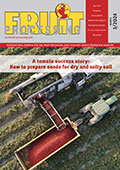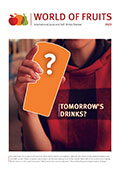The World Citrus Organisation (WCO) Secretariat, together with its partner Fruitnet Media International, is finalising preparations for the first edition of the Global Citrus Congress, which will take place on 5 November 2020. The Global Citrus Congress will bring together the citrus community to discuss the current trends, challenges and opportunities for the citrus sector. More than 300 participants from across the globe have already registered to attend the virtual congress.
The programme of the first edition of the Global Citrus Congress 2020 will highlight the key areas of interest for the sector. This will include production and marketing trends, facilitating cooperation between suppliers and retailers to add value to the citrus category, new technologies and supply chain innovation helping citrus producers and marketers to respond to consumer demands towards increased sustainability, and harnessing the nutritional power of citrus to develop more effective marketing campaigns. Confirmed speakers include top representatives from the global citrus community, including Ms Naomi Pendleton from AM FRESH Group, Mr Jose Luis Molina from Hispatec, Mr John Chamberlain from Limoneira and Stephan Wesit from Rewe.
WCO Co-Chair and Director of AILIMPO Jose Antonio Garcia affirmed, “There is no doubt that this first edition of the Global Citrus Congress will provide an excellent opportunity to discuss the challenges of the future and consolidate the role of the World Citrus Organisation as a meeting point for the great citrus fruit family. Cooperation, communication and constructive debate are the key to tomorrow’s success as these are the objectives of the Global Citrus Congress”. WCO Co-Chair and CEO of the Citrus Growers’ Association of Southern Africa Justin Chadwick added “As the World Citrus Organisation goes from strength to strength in terms of membership, this Congress will share important global citrus information and the views of leading actors in the sector. It is an event not to be missed”.
The Global Citrus Congress will be available live in both English and Spanish, and is free to join online and open to anyone with a smartphone or laptop and a high-speed internet connection. Registrations are still open at www.citruscongress.com.
Most decisions to buy are made directly at the point of sale: the significance of product presentation is growing, with an attractive visual appearance becoming ever more important. KHS is therefore now also offering its successful Innoket Neo labeling series for cans to manufacturers of small batches and producers with a high brand variety. The machine opens up new avenues in product marketing and flexibility in production. Warehouse capacities are reduced and energy is saved.
Images of production shops filled with pallets of differently printed empty cans will soon be a thing of the past. Says Cornelius Adolf, labeling product manager for KHS, “We’ve expanded our existing portfolio to include can labeling to give the customer more design options and enable these designs to be implemented faster with smaller warehouse capacities.” This is because minimum order quantities and long delivery times for empty cans limit flexibility. It is now possible to order unprinted cans within a much shorter period and to label them using the KHS Innoket Neo, thus simplifying logistics processes.
Wrap-around labels with optical alignment
The Innoket Neo can be used to apply self-adhesive film or paper labels. Here, the container can be either partly or fully wrapped with a label – including optical alignment. “The look and feel are unique”, is how Adolf explains the results of the self-adhesive labeling method. With this technology beverage producers can also respond much more rapidly and flexibly to the steadily growing variety of products and labels on the market. With this system the design or logo can be changed within a few hours and the cans dressed with suitable motifs. “Customers can even print their own labels. This considerably shortens the time to market. An attractive product is a clear distinguishing criterion at the point of sale,” says Adolf. As no cans with varying motifs have to be ordered, costs are also cut as higher numbers of unprinted containers can be purchased.
The space-saving machine with its 14 can plates driven by servomotors comes from the established Innoket Neo module system and gives manufacturers of small batches and producers with a great variety of brands many benefits. At high machine availability up to 35,000 full or empty cans in all standard sizes can be labeled per hour. The machine can be positioned upstream or downstream of the filler. Format changeovers are quick and do not require any additional tools. The labeler also has a high level of energy efficiency, with a power consumption of just five kilowatts per hour.









